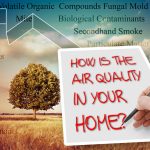How air pollution is damaging your liver
 (NaturalHealth365) If someone wanted to improve their liver health, most of us would probably suggest things like cutting back on alcohol, eating a nutritious diet, and avoiding harsh medications. All sound advice, of course – but we probably wouldn’t think to warn someone about air pollution effects.
(NaturalHealth365) If someone wanted to improve their liver health, most of us would probably suggest things like cutting back on alcohol, eating a nutritious diet, and avoiding harsh medications. All sound advice, of course – but we probably wouldn’t think to warn someone about air pollution effects.
Incredibly, a growing body of research reveals that exposure to poor air quality has been correlated to a number of liver problems, including cirrhosis, or advanced scarring of liver tissue.
Exposure to air pollution may damage the liver and reduce survival rates from liver cancer, research shows
Your liver is your body’s major detoxifying organ. Researchers now believe the growing environmental concern of air pollution could be threatening long-term liver health for millions of people, especially city-dwellers.
As an example, a just-released study published in the latest volume of Atmospheric Environment found that short-term exposure to air pollution in Wuhan, China – yes, the same Wuhan of coronavirus notoriety – was associated with impaired liver function, as indicated by abnormal liver function tests.
Another 2017 paper published in Cancer Epidemiology found that exposure to particulate matter from polluted air was associated with lower survival rates among people with liver cancer—and the greater the exposure to polluted air, the greater the life-shortening effect.
Particular matter contains environmental toxins and by-products including road dust, diesel and gasoline exhaust, and even pollutants put off by tires and engine brakes. Other compounds you may be breathing into your system when in a polluted environment include nitrogen dioxide (NO2), sulfur dioxide (SO2), carbon monoxide.
Hazardous airborne pollutants were also identified as a possible risk factor for liver cancer in a 2017 study from PLOS One involving people from Texas. Additional studies have suggested that exposure to airborne pollutants (most common in urban areas) may increase the risk of nonalcoholic fatty liver disease, namely by accelerating a build-up of collagen fibers in the liver (fibrosis) or advanced scarring of the liver (cirrhosis).
What explains all the negative pollution effects on liver function? Researchers hypothesize airborne pollutants trigger oxidative stress and inflammation in liver cells and liver tissue (let alone other cells, tissues, and organs in the body). The impact could have a cumulative and devastating effect for some people.
By the way:
Have you ever wondered what poor liver health might look or feel like? While you can only know for sure by checking with a healthcare provider, the following warning signs and symptoms may indicate that your liver isn’t functioning at its best, according to Mayo Clinic:
- A yellowish tint to the eyes and skin (jaundice)
- Swelling and pain in the stomach or right side of the abdomen
- Swelling in the legs and feet
- Dark-colored urine
- Pale-colored feces
- Itchy skin
- Fatigue
- Nausea or vomiting
- Skin that is easy to bruise
- Decreased appetite
To protect your family’s health: Use these two strategies to improve your home’s indoor air quality
You may not be able to control the quality of air in your town or city. But you can take steps to improve the air inside your home.
First, install a high-quality air purification system in your place of residence, and be sure to change out your filters regularly. In addition, consider adding more plants to your space.
While it’s not conclusively shown in the research whether indoor plants actually improve indoor air quality, some controlled studies and anecdotal reports indicate that plants like Peace Lilly, Lady Palm, and Bamboo Palm help to purify the air.
Lastly, be sure to buy only non-toxic household and personal care products. Bottom line: reducing your exposure to toxic substances will greatly improve the quality of your life.
Sources for this article include:
MayoClinic.org
Wiley.com
Reuters.com
HCPLive.com
Nature.com
PLOS.org
ScienceDirect.com



